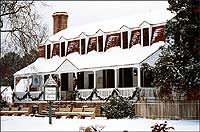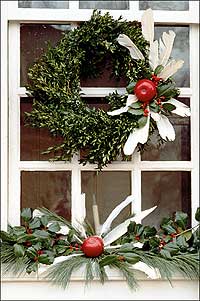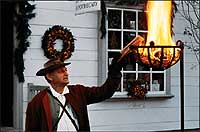Page content

Bedecked with Christmas garlands and rare December snow, Christiana Campbell's Tavern invites Colonial Williamsburg visitors within its doors to enjoy a traditional Virginia holiday menu.
Christmas in Colonial Virginia
Good Eating and good Porter are two great Supporters of Magna Charta and the British Constitution.
by Harold B. Gill, Jr.At Christmas play and make cheer
For Christmas comes but once a year
Good bread and good drink, a good fire in the hall
Brawn, pudding and souse, and good mustard withall:
Beef, mutton and pork, shred pies of the best:
Pig, veal, goose and capon and turkey well drest:
Cheese, apples and nuts, jolly carols to hear,
As then in the country is counted good cheer.
Thomas Tusser (c. 1520-1580)
Christmas is come, hang on the pot,
Let spits turn round, and ovens be hot;
Beef, pork, and poultry, now provide
To feast thy neighbors at this tide;
Then wash all down with good wine and beer,
And so with mirth conclude the Year.
Virginia Almanac (Royle) 1765
The two poems, written about 200 years and 3,000 miles apart, demonstrate that Christmas was kept much the same in mid-18th-century Virginia as it was in late 16th-century England.
Englishmen who came to the American colonies brought along their cultural traditions. In dress, manners, and social behavior, Virginia settlers tried to recreate the ambiance they had known back home. Their Christmas, like the English manors', evolved as an interval of leisure to enjoy feasting, visiting, dancing, and games. Even in Virginia's critical early days, the settlers did not forget Christmas. Captain John Smith wrote in 1609 that he kept "Christmas amongst the Salvages: where wee were never more merrie, nor fedde on more plentie of good oysters, fish, flesh, wild fowle, and good bread, nor better fires in England then in the drie warme smokie houses of Kecoughtan." Kecoughtan is now part of Hampton.
During the Christmas season of 1680, a French traveler accompanied by about 20 others, visited the Virginia home of William Fitzhugh where: "There was good wine and all kinds of beverages, so there was a great deal of carousing." Fitzhugh provided for entertainment "three fiddlers, a jester, a tight-rope walker, and an acrobat who tumbled around."
Not all English settlers celebrated Christmas. The New England Puritans declared the observation of Christmas illegal. Throughout the Christian world, ways of keeping Christmas have varied over the years and from place to place.
Some Christian groups have banned the celebration altogether, others have kept the holiday as a purely religious celebration, and still others incorporated traditions from pagan practices.
The legacy of the holiday brought to America is ambiguous. As one historian has written: "Christians had wrestled with questions of if, when, and how to celebrate Jesus' birth. As a commemoration of the miracle that established the Godly paternity of Jesus, Christmas was a celebration of the event upon which the existence of Christianity depended."
Viewing birthday celebrations as heathen, the earliest Christians paid little attention to Jesus' birth. It is not known exactly when the church began to celebrate Christmas. The first extant reference is dated 336 when the Roman Church began to celebrate a Feast of the Nativity on December 25th. By observing Jesus' birthday on that day, pagan traditions associated with the winter solstice—wassail bowls and the use of holly and other evergreens for decoration—came to be incorporated in the celebration.
The Christmas custom spread to England by the end of the 6th century and later reached Scandinavia where it became fused with the pagan Norse mid-winter feast season known as Yule. In the 9th century, during the reign of King Alfred, the Christmas celebration was extended by 12 days, ending on Epi phany, January 6th. Early in the 11th century the term Christes maesse, or festival of Christ, entered the English language, and early in the next century Xmas had come into use. Though it bothered church officials, vestiges of pagan merriment remained a part of Christmas celebrations. Some prayed that "sacred would overtake profane as pagans gave up their revels and turned to Christianity." But merry-making and feasting remained the most popular ways to celebrate Christmas in England. Charles Lamb wrote of his Christmas while a student at Christ's Hospital in London during the last quarter of the 18th century:
Let me have leave to remember the festivities at Christmas, when the richest of us would club our stock to have a gaudy day, sitting round the fire, replenished to the height with logs, and the pennyless and he that could contribute nothing, partook in all the mirth and in some of the substantialities of the feasting; the carol sung by night at that time of the year, which, when a young boy, I have so often laid awake from seven, (the hour of going to bed) till ten, when it was sung by the older boys and monitors, and have listened to it in their rude chanting, till I have been transported to the fields of Bethlehem, and the song of which was sung at the season by the angels' voices to the shepherds.Colonial Virginians rarely wrote descriptions of Christmas observations, or, for that matter, any holiday celebrations. That's not unusual. Most diarists don't record routine events. Studying the many diaries left by Virginians, the reader might conclude that the colonists never put on clean clothes, washed themselves, or shaved.
We look instead at the writings of visitors who found Virginia customs new or unusual. From their few comments about Christmas, it seems Virginians observed the occasion with balls, parties, visits, and good food. Thomas Jefferson wrote December 25, 1762, that Christmas was a "day of greatest mirth and jollity."
Nicholas Cresswell, an Englishman who spent years in Virginia and kept a journal, wrote while in Alexandria on December 25, 1774: "Christmas Day but little regarded here." Cresswell did, however, attend a ball on Twelfth Night:
The following Christmas he was in Frederick County where he noted "Christmas Day but little observed in this Country except it is amongst the Dutch."There was about 37 Ladys Dressed and Powdered to the like, some of them very handsom, and as much Vanity as is necessary. All of them fond of Dancing. But I do not think they perform it with the greatest elleganse. Betwixt the Country Dances they have What I call everlasting Jiggs.
A Couple gets up, and begins to dance a Jig (to some Negro tune) others comes and cuts them out, these dances allways last as long as the Fiddler can play. This is social but I think it looks more like a Bacchanalian dance then one in a polite Assembly. Old Women, Young Wifes with young Children on the Laps, Widows, Maids, and Girls come promsciously to these Assemblys which generally continue til morning. A Cold supper, Punch, Wine, Coffee, and Chocolate, But no Tea. This is a forbidden herb. The men chiefly Scotch and Irish. I went home about Two Oclock, but part of the Company stayd got Drunk and had a fight.
Philip Vickers Fithian of New Jersey, tutor to the Carter family of Nomini Hall in Virginia, recorded his first Virginia Christmas experience December 18, 1773: "Nothing is now to be heard of in conversation, but the Balls, the Fox-hunts, the fine entertainments, and the good fellowship, which are to be exhibited at the approaching Christmas. I almost think myself happy that my Horses lameness will be sufficient Excuse for my keeping at home on these Holidays." On Christmas, Fithian noted that "Guns are fired this Evening in the Neighbourhood, and the Negroes seem to be inspired with new Life."

During the holiday season, Colonial Williamsburg doors and windows are wreathed in arrangements fashioned of natural materials. This boxwood construction is accented with holly, pine, apples, and feathers. Among other popular accents are oranges, pineapples, and seashells.
Christmas day was spent quietly, but Fithian said he "was waked this morning by Guns fired all round the House." He gave slightly more than three shillings to the servants for a "Christmas Box, as they call it." He thought the dinner was "no otherwise than common, yet as elegant a Christmas Dinner as I ever sat Down to." On December 29th Fithian reopened his school after a five-day holiday, and he recorded that they had a large pie "to signify the Conclusion of the Holidays."
Gifts were usually given to children and servants. Jefferson recorded in his 1779 account book that at Christmas he spent 48 shillings for Christmas presents. Some advertisements in colonial newspapers offered toys for Christmas treats for children.
Christmas was observed in most southern colonies in much the same way. William Stephens described the holidays in Savannah in 1742. He wrote:
How irregular so ever we may be in many things, very few were to be found who payd no regard to Xmas Holy days, and it was a slight which would ill please our Adversaries, had they seen what a number of hail young Fellows were got together this day, in, and about the Town, at Crickett, and such kinds of Exercise, nor did I hear of any disorders there guilty of over their Cups in the Evening.
In 1805, when James Iredell of North Carolina was attending college at Princeton, he was surprised to learn not everyone observed Christmas. He wrote that Christmas, at home "welcomed with so many demonstrations of joy, is here regarded almost with perfect indifference & passed over as but little more than an ordinary day."
The Virginia observation of Christmas tended towards good fellowship and good eating. The Virginia Almanac for 1772 carried these sentiments on a December page:
This Month much Meat will be roasted in rich Mens Kitchens, the Cooks sweating in making of minced Pies and other Christmas Cheer, and whole Rivers of Punch, Toddy, Wine, Beer, and Cider consumed with drinking. Cards and Dice will be greatly used, to drive away the Tediousness of the long cold Nights; and much Money will be lost at Whist Cribbage and All fours.In England the custom was for an apprentice to visit each of his master's clients to collect tips for his services throughout the year, the custom apparently was followed in Virginia.
Soon after the Revolution, St. George Tucker of Williamsburg wrote "Christmas Verses for the Printer's Devil":
Now the season for mirth and good eating advances,
Plays, oysters and sheldrakes, balls, mince pies and dances;
Fat pullets, fat turkeys, and fat geese to feed on,
Fat mutton and beef; more by half than you've need on;
Fat pigs and fat hogs, fat cooks and fat venison,
Fat aldermen ready the haunch to lay hands on;
Fat wives and fat daughters, fat husbands and sons,
Fat doctors and parsons, fat lawyers and duns;
What a dancing and fiddling, and gobbling and grunting,
As if Nimrod himself had just come in from hunting!
These all are your comforts—while mine are so small,
I may truly be said to have nothing at all.
I'm a Devil you know, and can't live without fire,
From your doors I can see it, but I dare not come nigher;
Now if you refuse me some wood, or some coal,
I must e'en go and warm, in old Beelzebub's hole;
Next, tho' I'm a devil, I drink and I eat,
Therefore stand in need of some rum, wine and meat;
Some clothes too I want—for I'm blacker than soot,
And a hat, and some shoes, for my horns and my foot;
To supply all these wants, pray good people be civil
And give a few pence to a poor printer's devil.
In 1772, the Virginia Gazette published a letter from "An Old Fellow," who lived in England. He complained about the "Decay of English Customs and Manners." After describing the old English Christmas when the kitchen was "the Palace of Plenty, Jollity, and good Eating," he wrote:
Now mark the Picture of the present Time: Instead of that firm Roast Beef, that fragrant Pudding, our Tables groan with the Luxuries of France and India. Here a lean Fricassee rises in the Room of our majestick Ribs, and there a Scoundrel Syllabub occupies the Place of our well-beloved Home-brewed. The solid Meal gives Way to the slight Repast; and, forgetting that good Eating and good Porter are two great Supporters of Magna Charta and the British Constitution, we op en our Hearts and our Mouths to new Fashions in Cookery, which will one Day lead us to Ruin."
The "Old Fellow" should have come to Virginia.
Harold Gill, a retired Colonial Williamsburg historian, contributed two stories about Williamsburg's founding to the April/May journal.
Visit our Christmas section (will open in new window).

